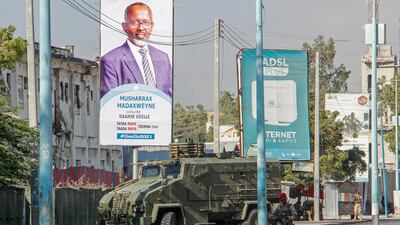The US on Monday urged Somalia’s president and his political rivals to break a deadlock and hold elections before the country is engulfed by worsening violence from an extremist insurgency.
At UN Security Council talks, US envoy Richard Mills called for a swift resolution to the political crisis surrounding President Mohamed Abdullahi Mohamed, known as Farmajo, whose term expired this month.
Somalia’s parliament was set to choose a new president on February 8, but voting was delayed because new members of the legislature had yet to be chosen. Opponents of Mr Mohamed, who seeks a second term, say he packed decision-making bodies with loyalists.
“We call on President Farmajo and Somalia’s federal member state leaders to act swiftly to resolve the political impasse that threatens Somalia’s future and to find an agreement to allow the conduct of parliamentary and presidential elections immediately,” Mr Mills said.
The US envoy’s comments were among the first on Somalia from the month-old administration of President Joe Biden, but did not indicate whether Washington would pursue the previous Trump administration’s bid to withdraw US forces from the nation.
The deadlocked political transition has stoked tension in Somalia, which has been ravaged by decades of civil war and drought and which still battles an insurgency by Al Shabab, an extremist group that frequently stages attacks in the capital Mogadishu and elsewhere.
Officials in two of Somalia’s semi-autonomous regions – Jubbaland and Puntland – expressed concern over the expiration of Mr Mohamed’s term and suggested he should be barred from the process.
Government forces and supporters of opposition figures exchanged gunfire in Mogadishu on Friday at a protest against the stalled vote. Rival presidential candidates have called for more rallies until a new leader is selected.
Mr Mills urged Somalia’s feuding factions to “endorse the recommendations” of a committee that last week proposed technical solutions to the crisis and also ensure that women played a bigger role in Somalian politics.
“Let me be clear: partial parallel or alternative election processes, including prolonged interim governing arrangements, will only further increase prospects for instability and be a major setback for Somalia,” he said.
Somalia had planned to hold elections to pick a president and representatives in what would have been the country’s first direct vote since a civil war erupted in 1991 and toppled the long-standing dictator Siad Barre.
But planning for a general election was marred by delays when the country faced a spike in Al Shabab raids, and the process was switched instead to an indirect vote in which representatives are selected by a group of elders and others.
“Growing political tensions threaten Somalia’s state-building progress and even security unless they are resolved through dialogue and compromise in the interest of the country,” James Swan, the UN peace envoy to Somalia, said.
“Unfortunately, instead we are seeing increased brinkmanship, pressure tactics and tests of strength that can only heighten risks.”


